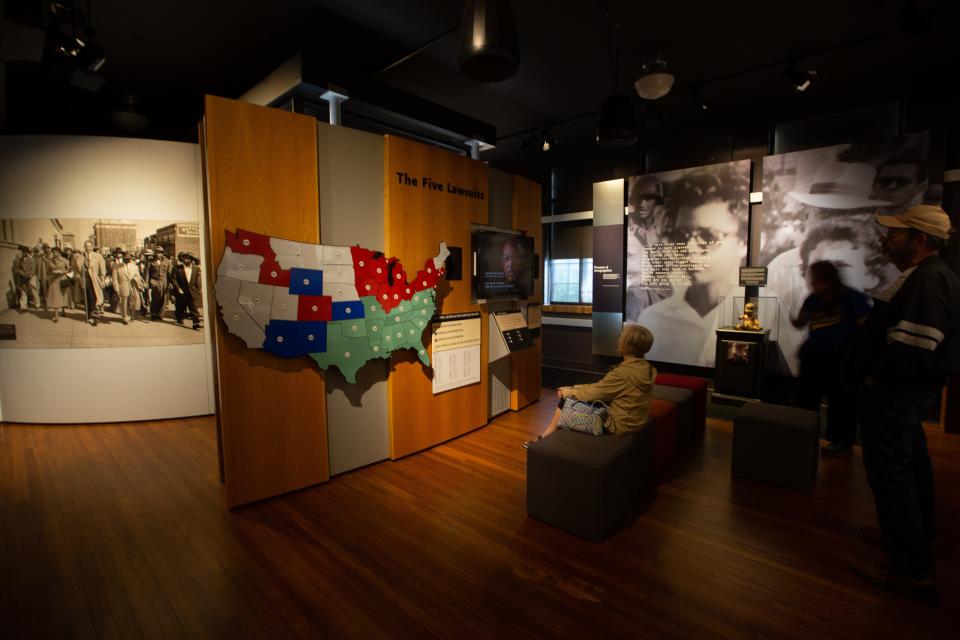Brown v. Board of Education National Historical Park marks 30-year anniversary with symposium
Three months after the National Park service announced James Williams as the new superintendent of Brown v. Board of Education National Historic Park of Topeka, the site opened its doors in celebration of the 30th anniversary of its designation.
The symposium at the Brown v. Board of Education site, 1515 S.E. Monroe, also welcomed leaders from five new affiliated areas and an additional National Park Service site.
"It's just interesting to me, to get to know the people, get to know their stories and see the potential for us as a agency to help the American people understand the complexity of the Brown decision and all the history that went into it," Williams said.
What makes the symposium historic?
This week's symposium is historic because it brought together — for the first time — people from each of the sites that are part of Brown v. Board of Education National Historical Park, said Sean Dixon, president of Visit Topeka.
He noted that President Joe Biden last May signed the Brown v. Board of Education National Historical Park Expansion and Redesignation Act.
That act continues federal government efforts to recognize the landmark Brown v. Board of Education Supreme Court decision, which banned racial segregation in schools in 1954. Lawsuits linked to two schools in South Carolina and one each in Kansas, Virginia, Delaware and the District of Columbia were all consolidated into that case.
Michael Hines, Jonna Perrillo and Zoe Burkholder were guest speakers for the symposium. The professors presented curriculum on school segregation and education equity.

"As a child, I didn't fully understand the impact of it until I started getting older and being able to process more intellectually about this," said Ethel Brown Marshall. "That was when I started understanding the real impact of what this was all about."
Brown Marshall was an original petition signer on the historic Briggs v. Elliott case. Briggs v. Elliott was one of the lawsuits consolidated into Brown v. Board of Education Supreme Court decision.
Harry Briggs and 20 other parents of Clarendon County, school district one, filed a suit against president of the school board, R.W. Elliott, challenging segregation. Originally, parents asked the county to provide school buses for black students as they did for white students.
Brown Marshall was in the first grade when she signed the petition, and her parents told her, "This is what we're going to do."
More:Seaman school board removes one book but leaves two others after challenges for 'obscene' content
"You can't deny that we've come a long way," she said. "However, I am really, very concerned now about the ethics of some of the groups in this society who try to rewrite history."
Brown Marshall said she is worried about the "business of banning books" in education today.
"When you can control information," she said, "you control the people, and that's what I'm worried about."
How did this week's event promote teamwork?
The legislation Biden signed in May redesignated Topeka's Brown v. Board of Education National Historic Site, which officially opened in 2004, as Brown v. Board of Education National Historical Park.
It added the two school sites in South Carolina to the newly created park while designating the sites in Virginia, Delaware and the District of Columbia as "affiliated areas."
Site superintendent Williams said the affiliated areas will remain independent, but the law allows them to enter into cooperative agreements and provide technical assistance and available funding to help them mark, interpret and preserve their stories.
Dixon said the symposium in Topeka will allow organizers to begin planning for the 70th anniversary of the Brown v. Board ruling, which will be in 2024.
Keishera Lately is a business reporter for the Topeka Capital-Journal. She can be reached at klately@cjonline.com. Follow her on Twitter at @Lately_KT.
This article originally appeared on Topeka Capital-Journal: 30-year anniversary for Topeka's Brown v Board national park

